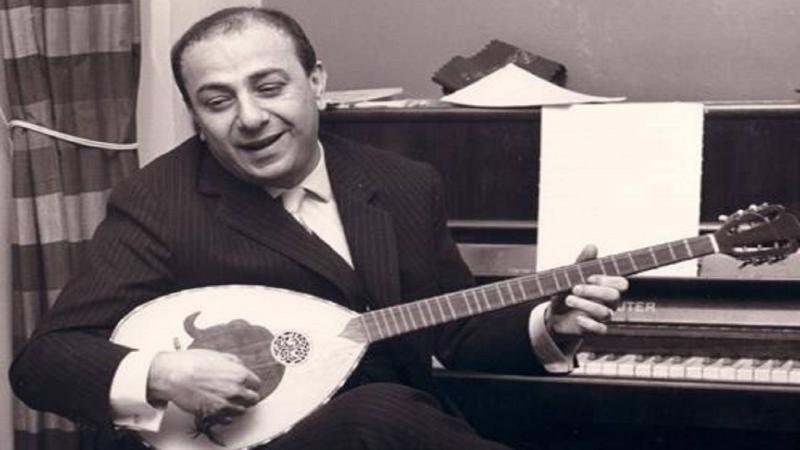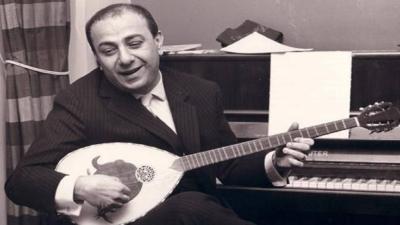He entered the art world through its widest gates; he was known globally as a composer, musician, playwright, and poet. His rare talent placed him at the forefront, both Arabically and internationally, and his diverse works distinguished him from others. He is the creative Lebanese artist Assi Hanna Rahbani. Today, Thursday, May 4th, marks the centenary of his birth. Over 63 years, Assi crafted his unique musical identity, becoming a respected artistic reference.
**A Glimpse into His Childhood:**
The son of the town of Antelias began his journey out of passion and talent, sneaking to learn music through the window, unable to join the choir established by Father Paul Al-Ashqar. Father Antoine discovered his talent when Assi correctly answered a question posed to the students that no one else could. From that moment, Father Antoine began to teach him the principles of music theory, Eastern melodies, and church music for six years, and then continued his education in Western music composition and theory under Professor Bertrand Robillard.
Assi started with the violin, followed by the piano, and then the oud, which he adorned with new elements and honored through performances of various prominent melodies, with its strings complementing Fairuz's voice. Together with his brother Mansour, they formed a unique duo, known as the Rahbani brothers, who shared in writing songs, musicals, and composing music.
The Rahbani brothers grew up in a family environment rich in music and collaborated throughout their lives, sharing artistic endeavors. While both were credited for their works, Assi's dominance in the details and the final output secured him a greater status and a more significant role in building the grand Fairuz-Rahbani legacy.
Assi first met Fairuz backstage at the Lebanese Radio in 1950; their initial encounter blossomed with their first works gaining popularity, including "Habibti Ya Khabibi" and "Bilmah Zhial Habib" among other romantic songs. Over time, the relationship between Fairuz and Assi deepened, uniting them in love and art. They announced their marriage in 1955 and had four children: Ziad, Hali, Layal, and Rima. The couple later decided to establish the Fairuz-Rahbani Foundation to produce films, witnessing their success.
Fairuz and Assi's love story was filled with many hardships and longing. The song "Sa'alouni Al-Nas Anak Ya Habibi" embodies her love for Assi, sung by Fairuz in 1973 after Assi suffered a brain hemorrhage, with the music composed by their son, Ziad Rahbani. This song symbolized Assi’s first absence from her life. Despite their divorce in 1978, Assi continued to compose songs for her.
**His Works:**
The Rahbani brothers and Fairuz participated in the second Baalbek Festivals in 1956, marking the launch of Lebanese nights at the festival under the title of "Lebanese Folk Art." "Days of Harvest, Customs and Traditions" showcased scenes of harvesting, engagement, and weddings, subsequently establishing a new tradition and history with "Lebanon, O Green Beautiful."
The Rahbani brothers produced numerous theatrical works featuring a stellar cast of Lebanese artists, such as Nasri Shamseddine, Joseph Nassif, Joseph Azar, Eli Choueiry, Khalil Tabet, William Haswani, and Geita Dayeh, among others. Alongside dozens of theatrical productions, the Rahbani brothers created films such as "Bayya al-Khawatim" (1965), "Safar Bark" (1967), "Bint Al-Hariss" (1968), and "Awdat Hamido" (1971).
**His Illness and Departure:**
On September 26, 1972, Assi unexpectedly suffered a severe hemorrhage on the left side of his brain. Doctors informed Fairuz about the serious nature of his condition and the urgent need for brain surgery to save his life, considering heavy complications that could result from the surgery, including blindness, paralysis, or brain damage.
In a near-miraculous incident, less than three months after his critical health crisis, and in the presence of Fairuz, Mansour, and some friends, Assi picked up the oud and released his new melody for Fairuz, "Layali Al-Shamal Al-Hazina," a sad and chant-like tune. This was the first melody Assi composed post his health crisis for the musical "Al-Mahtah," which he had begun writing and scoring before his hemorrhage.
In the early 1980s, Assi was hospitalized multiple times, the last being in 1986, where he fell into a coma lasting six months. On Music Day, June 21, 1986, the first day of summer and Father's Day, Assi passed away and was laid to rest in Lebanon.




